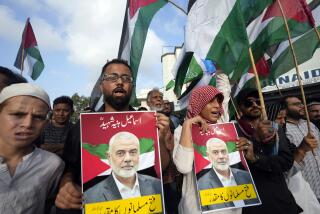A Shove Toward Peace
- Share via
Secretary of State Condoleezza Rice did the necessary nudging in her weekend meetings with Israeli Prime Minister Ariel Sharon and Palestinian Authority President Mahmoud Abbas. But the disappointing Sharon-Abbas meeting Tuesday indicated that the U.S. may have to upgrade the nudges to pushes and shoves.
Rice’s two-day visit to Israel and the West Bank was aimed at getting Sharon and Abbas to coordinate Israel’s planned August evacuation of settlers from Gaza and four smaller enclaves in the northern West Bank. Done properly, the withdrawal could be a milestone en route to creation of a Palestinian state and could free Israel from having to use its soldiers to protect about 8,500 Israeli settlers in Gaza amid 1.3 million Palestinians. But if radical groups such as Hamas and Islamic Jihad attack Israelis during the withdrawal, Sharon’s government won’t continue working with Abbas.
Rice said she found a “good spirit of cooperation” between the two leaders, with whom she met separately. Unfortunately that spirit was less evident when Abbas and Sharon met Tuesday, for the first time since February. Afterward, Palestinian Authority Prime Minister Ahmed Korei said the summit was “difficult” and he faulted Israel for offering too little.
Sharon did renew a pledge to withdraw soldiers from two occupied West Bank towns if violence stops, but that just served to remind Palestinians that troops have so far been withdrawn from only two towns. Israel had earlier agreed to pull out of five. Sharon complained to Abbas that the Palestinian Authority has not cracked down on militants, which the Israeli government has cited as the reason the three other towns are still under its control.
The summit atmosphere was not helped by recent events: A day before the meeting, Islamic Jihad gunmen killed a Jewish settler in the West Bank, and Israeli troops killed a 17-year-old Palestinian whose relatives said he hoped to slip into Israel from Gaza to seek work. Compared with the thousands of deaths in the uprising that began in September 2000, there has been relatively little violence since the February meeting between the two leaders. But the danger remains. A woman permitted to cross into Israel on Monday for medical treatment was found to have explosives strapped to her body; she said she had planned to blow herself up when she reached a hospital.
After Israel, Rice went to Egypt and Saudi Arabia, where she publicly urged both governments to allow their citizens more freedom. That’s a worthwhile message, but even more important is keeping the pressure on Israel and the Palestinians to complete the Gaza withdrawal and start taking the necessary steps outlined in the “road map” drawn up a few years ago. U.S. involvement is critical to the success of a process that could eventually give Israel peace and security and the Palestinians a country of their own.
More to Read
Sign up for Essential California
The most important California stories and recommendations in your inbox every morning.
You may occasionally receive promotional content from the Los Angeles Times.













